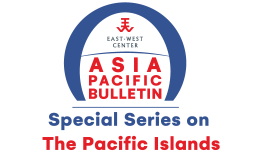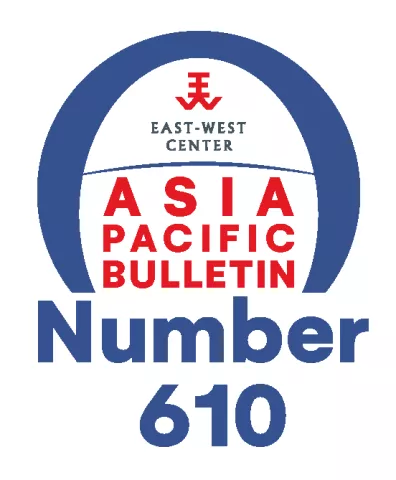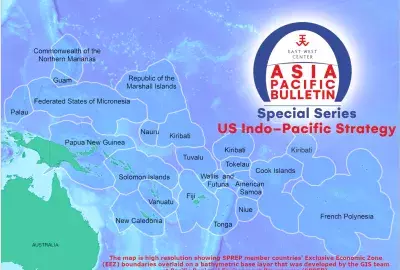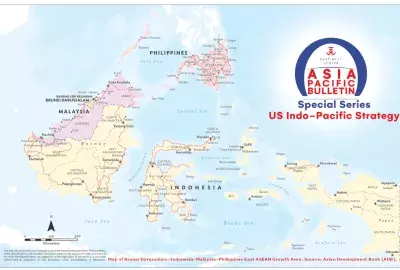Error message
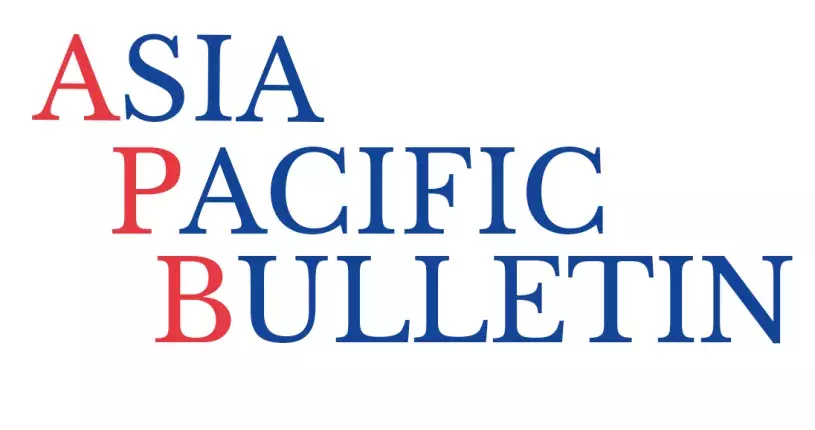
Dina Shek, Legal Director of the Medical-Legal Partnership for Children in Hawai'i and Faculty Specialist at the William S. Richardson School of Law & Shanty Sigrah Asher, JD, Pacific Islander Liaison Officer at the Office of Economic Revitalization for the City and County of Honolulu, explain the importance of including indigenous expertise in policymaking and outlines steps to be more inclusive of Micronesian voices in policy formulation. |
As advocates for Micronesian communities in Hawai‘i, the co-authors have witnessed what happens when indigenous Micronesian expertise is not sought directly from Micronesians, but instead politicians and decision makers engage with non-Micronesian “experts” who speak for those affected by laws and policies. This leaves community members, front-line advocates, and rising professionals feeling excluded and disregarded. Additionally, such exclusive practices result in finalized plans that fail to recognize cultural, linguistic, and day-to-day practices of recipients; thus, creating barriers to access and failures to address underlying needs. In contrast, we have also seen and engaged in successful policy efforts where Micronesian expertise comes from all sectors—from struggling families in Hawai‘i, to community advocates helping families to navigate complex systems, to Micronesian diplomats and church leaders opening their meeting spaces to Micronesian youth. When meaningfully engaged, these unlikely “experts” have forged relationships with government leaders, shifted policies and messaging during the pandemic, and established non-profit organizations and governmental roles that are poised to significantly change the face of Micronesian expertise in Hawai‘i and broader Oceania.
In a recent article, we highlighted Micronesian-led responses to the COVID-19 pandemic in Hawai‘i, uplifting the extraordinary—and often under-recognized and underfunded—work by and for Micronesian communities. Our article, “Micronesians Building Healthier Communities During the COVID-19 Pandemic,” called for more collaborations and relationships built on trust and respect between government leaders and policymakers, non-profits and social service providers, and grassroots communities. We argued that this work must be culturally responsive and embrace Micronesian protocols and practices. We now focus on our call to include Micronesian expertise at all levels of policymaking, and especially the voices and insights of those most directly impacted by the laws and policies we seek to change.
We propose several specific approaches that apply to all levels of policy engagement: from small, grassroots efforts in Hawai‘i to state and federal agency work, and finally to international settings like the current renegotiation of the Compacts of Free Association. At all levels, people in power must be more inclusive of Micronesian voices and expanding Micronesian expertise to include the people most affected.
Elevate Micronesian Leadership
First and foremost, it is essential to hire people from the communities being served. This practice is commonly embedded in community health centers, where one can see the immediate benefits of providing culturally and linguistically appropriate and accessible services. The powerful impact of elevating Micronesians into leadership positions occurred in Hawai‘i during the pandemic. After then Mayor of Honolulu, Kirk Caldwell, met with Micronesian community leaders and acknowledged that the community had been “forgotten” amidst the pandemic, Mayor Caldwell created a Pacific Islander Liaison Officer position within his administration’s Office of Economic Revitalization. Co-author Shanty Asher currently holds this position which has been retained through a change in mayoral leadership. This position was one of the several government positions that were created to give a voice for indigenous Pacific Islanders to participate in decision making and policy implementation. Such opportunities improved trust, access to resources, and partnership between government and the communities they serve.
Move from Focus Groups to Consultants
As community advocates, we have seen all too often when input from Micronesians is considered only after the grant has been awarded, after the policy has been drafted, and after partners have been determined. We suggest that rather than seeking “input” from Micronesian communities through focus groups and surveys, consider engaging them as experts in paid leadership and consulting positions and as thought partners. Elevate Micronesian expertise early and at all levels: before the grant is submitted, before the policy is written, and before the partners are committed.
Fund Micronesian-Led Community Organizations
Elevating Micronesian expertise calls for funding Micronesian-led work at levels equal to their impact. This means moving from being the targets of the intervention and subjects of the grant, to being the grant recipients and equal partners. Too many Micronesian non-profit and non-governmental organizations are expected to toil unpaid or serve as under-resourced sub-grantees. Instead, their front-line experience and expertise should be recognized and funded. Projects “targeting” Micronesians should be led by and meaningfully engage Micronesians at all stages of the work.
Include Diverse Voices at All Levels
From the grassroots to the grasstops, including diverse voices improves outcomes. This is true whether developing a grant to support Micronesian youth or improving pandemic-related relief programs or preparing to renegotiate the Compacts of Free Association. In all these settings, Micronesians living at home or abroad hold critical information and insights about the impacts of various programs and policies. For example, Micronesian community members and advocates living across the United States and its territories strongly desire the opportunity for their voices to be heard. In the words of one Marshallese advocate, “I really want to ask my government to give the opportunity for COFA citizens here in the US to be part of the COFA Negotiation team.”
We must respect all voices in the Micronesian diaspora. When Micronesian leaders were passed over for leadership in the Pacific Islands Forum in early 2021, the President of Palau, Surangal Whipps, Jr., said they had no choice but to withdraw after being “thoroughly and publicly disregarded.” This respect demanded by Micronesians at international forums is the same respect needed at the grassroots level. Only by honoring Micronesian expertise in all its forms will we make better policies to improve the lives of Micronesians at home and abroad.
Dina Shek, Legal Director of the Medical-Legal Partnership for Children in Hawai'i and Faculty Specialist at the William S. Richardson School of Law & Shanty Sigrah Asher, JD, Pacific Islander Liaison Officer at the Office of Economic Revitalization for the City and County of Honolulu, explain the importance of including indigenous expertise in policymaking and outlines steps to be more inclusive of Micronesian voices in policy formulation. |
As advocates for Micronesian communities in Hawai‘i, the co-authors have witnessed what happens when indigenous Micronesian expertise is not sought directly from Micronesians, but instead politicians and decision makers engage with non-Micronesian “experts” who speak for those affected by laws and policies. This leaves community members, front-line advocates, and rising professionals feeling excluded and disregarded. Additionally, such exclusive practices result in finalized plans that fail to recognize cultural, linguistic, and day-to-day practices of recipients; thus, creating barriers to access and failures to address underlying needs. In contrast, we have also seen and engaged in successful policy efforts where Micronesian expertise comes from all sectors—from struggling families in Hawai‘i, to community advocates helping families to navigate complex systems, to Micronesian diplomats and church leaders opening their meeting spaces to Micronesian youth. When meaningfully engaged, these unlikely “experts” have forged relationships with government leaders, shifted policies and messaging during the pandemic, and established non-profit organizations and governmental roles that are poised to significantly change the face of Micronesian expertise in Hawai‘i and broader Oceania.
In a recent article, we highlighted Micronesian-led responses to the COVID-19 pandemic in Hawai‘i, uplifting the extraordinary—and often under-recognized and underfunded—work by and for Micronesian communities. Our article, “Micronesians Building Healthier Communities During the COVID-19 Pandemic,” called for more collaborations and relationships built on trust and respect between government leaders and policymakers, non-profits and social service providers, and grassroots communities. We argued that this work must be culturally responsive and embrace Micronesian protocols and practices. We now focus on our call to include Micronesian expertise at all levels of policymaking, and especially the voices and insights of those most directly impacted by the laws and policies we seek to change.
We propose several specific approaches that apply to all levels of policy engagement: from small, grassroots efforts in Hawai‘i to state and federal agency work, and finally to international settings like the current renegotiation of the Compacts of Free Association. At all levels, people in power must be more inclusive of Micronesian voices and expanding Micronesian expertise to include the people most affected.
Elevate Micronesian Leadership
First and foremost, it is essential to hire people from the communities being served. This practice is commonly embedded in community health centers, where one can see the immediate benefits of providing culturally and linguistically appropriate and accessible services. The powerful impact of elevating Micronesians into leadership positions occurred in Hawai‘i during the pandemic. After then Mayor of Honolulu, Kirk Caldwell, met with Micronesian community leaders and acknowledged that the community had been “forgotten” amidst the pandemic, Mayor Caldwell created a Pacific Islander Liaison Officer position within his administration’s Office of Economic Revitalization. Co-author Shanty Asher currently holds this position which has been retained through a change in mayoral leadership. This position was one of the several government positions that were created to give a voice for indigenous Pacific Islanders to participate in decision making and policy implementation. Such opportunities improved trust, access to resources, and partnership between government and the communities they serve.
Move from Focus Groups to Consultants
As community advocates, we have seen all too often when input from Micronesians is considered only after the grant has been awarded, after the policy has been drafted, and after partners have been determined. We suggest that rather than seeking “input” from Micronesian communities through focus groups and surveys, consider engaging them as experts in paid leadership and consulting positions and as thought partners. Elevate Micronesian expertise early and at all levels: before the grant is submitted, before the policy is written, and before the partners are committed.
Fund Micronesian-Led Community Organizations
Elevating Micronesian expertise calls for funding Micronesian-led work at levels equal to their impact. This means moving from being the targets of the intervention and subjects of the grant, to being the grant recipients and equal partners. Too many Micronesian non-profit and non-governmental organizations are expected to toil unpaid or serve as under-resourced sub-grantees. Instead, their front-line experience and expertise should be recognized and funded. Projects “targeting” Micronesians should be led by and meaningfully engage Micronesians at all stages of the work.
Include Diverse Voices at All Levels
From the grassroots to the grasstops, including diverse voices improves outcomes. This is true whether developing a grant to support Micronesian youth or improving pandemic-related relief programs or preparing to renegotiate the Compacts of Free Association. In all these settings, Micronesians living at home or abroad hold critical information and insights about the impacts of various programs and policies. For example, Micronesian community members and advocates living across the United States and its territories strongly desire the opportunity for their voices to be heard. In the words of one Marshallese advocate, “I really want to ask my government to give the opportunity for COFA citizens here in the US to be part of the COFA Negotiation team.”
We must respect all voices in the Micronesian diaspora. When Micronesian leaders were passed over for leadership in the Pacific Islands Forum in early 2021, the President of Palau, Surangal Whipps, Jr., said they had no choice but to withdraw after being “thoroughly and publicly disregarded.” This respect demanded by Micronesians at international forums is the same respect needed at the grassroots level. Only by honoring Micronesian expertise in all its forms will we make better policies to improve the lives of Micronesians at home and abroad.


